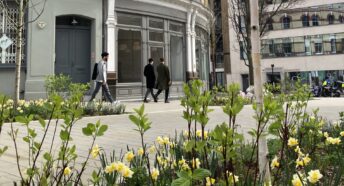Musings on Junction 8
Maidstone Borough Council has refused planning permission for the second time for Gallagher’s ‘Waterside Park’ at J8 of the M20. This is great news for all of us who have been fighting this development over the last two years.
Despite the Maidstone planners recommending approval, the planning committee was not persuaded that the changes made to the proposal would overcome the previous reason for refusal. This was the right and obvious decision. Gallaghers had been clearly told by the Council when they were first refused permission in February that “The application was considered to be fundamentally contrary to the provisions of the Development Plan and the NPPF, and there were not considered to be any solutions to resolve this conflict.”
Given this clear message, we’re concerned that the officers saw the revised application, for the same development, as being acceptable. This really is difficult to understand, but at least common sense and consistency of decision making has prevailed, and the committee members are to be applauded.
The battle though is not over. Gallaghers have already appealed against the earlier planning refusal, which will mean another expensive Public Inquiry next year. More worrying though, is that despite removing proposals for development at J8 from the draft Local Plan earlier this year, Council officers now want them put back in the Plan. In a report to the Council’s Planning Overview and Scrutiny Committee next Tuesday (21st) planning officers are claiming that new evidence means that J8 is the only option for new employment development. This does not bode well for how hard the officers will fight the planning appeal when they think that J8 is a good place for development.
Let’s hope that last night’s decision will make the officers think again, and finally accept that neither their own councillors nor local people want to see damaging development in the countryside at J8.
- A number of important documents have yet to emerge. For example, a rigorous transport plan and a finalised air-quality assessment. The latter is critical given that allocations at Teynham will feed extra traffic into AQMAs.
- There seems to be no coherent plan for infrastructure delivery – a key component of the plan given the allocations being proposed near the already crowded Junction 7.
- There seems to have been little or no cooperation with neighbouring boroughs or even parish councils within Swale itself.
The removal of a second consultation might have been understandable if this final version of the plan were similar to that being talked about at the beginning of the consultation process. It is, however, radically different in the following ways:
- There has been a major shift in the balance of housing allocations, away from the west of the borough over to the east, especially around the historic town of Faversham. This is a move that raises many concerns.
- A new large allocation, with accompanying A2 bypass, has appeared around Teynham and Lynsted, to which we are objecting.
- Housing allocations in the AONB around Neames Forstal that were judged “unsuitable” by the council’s own officers have now appeared as part of the housing numbers.
- Most of the housing allocations being proposed are on greenfield sites, many of them on Grade 1 agricultural land – a point to which we are strongly objecting.
Concerns about the rush to submit the plan
The haste with which the plan is being prepared is especially worrying given the concentration of housing in Faversham. If the town is to take a large amount of new housing, it is imperative that the policies concerning the area are carefully worked out to preserve, as far as possible, the unique nature of the town. The rush to submit the plan is likely to prove detrimental.
As Swale does not have a five-year land housing supply, it is open to speculative development proposals, many of which would run counter to the ideas contained in the current plan. Some are already appearing. This is a common situation, and one that, doubtless, is a reason behind Swale’s haste.
Our overriding fear, however, is that this emphasis on haste is ultimately going to prove counterproductive. This is because it is our view that the plan, in its current form, is unlikely to pass independent examination. We are urging Swale to listen to and act upon the comments being made about the plan and to return the plan to the council with appropriate modifications before submitting it to the Secretary of State.
Essentially, this means treating the current consultation not as the final one but as the ‘lost’ second consultation.
The consultation ends on Friday 30 April and we strongly urge residents to make their opinions known if they have not already done so.
Further information








